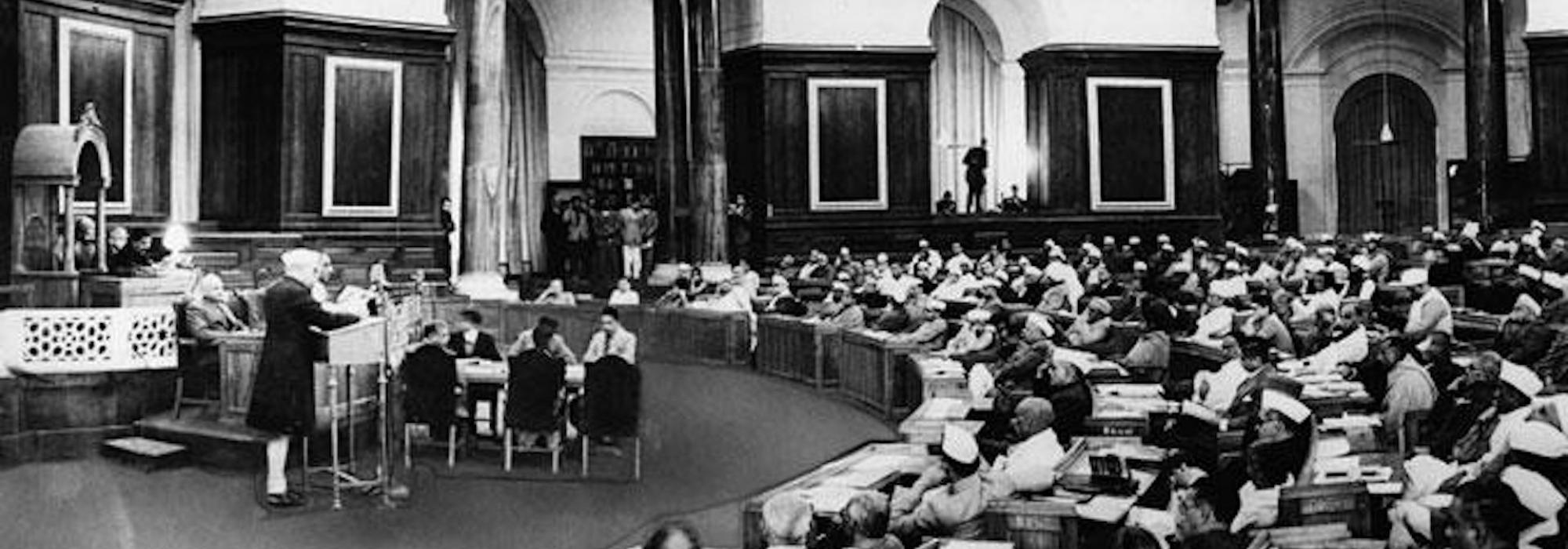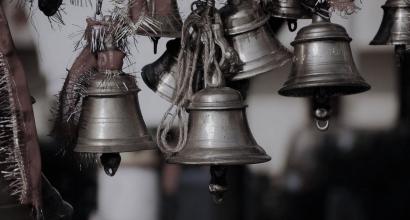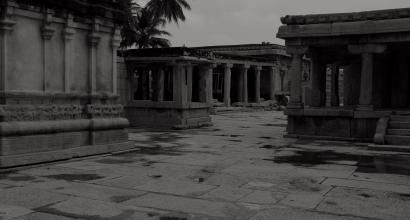horāḍu bīḻvannamobbaṃṭiyādoḍaṃ ।
dhīrapathavane bedaku sakalasamayadoḻaṃ ॥
dūradali goṇagutta bāḻva bāḻgenu bele? ।
hori sattvava merasu - maṃkutimma ॥ 573 ॥It is okay if you fall and you fall alone.
You still must continue fighting. Always seek the courageous path. Of what value is a life lived on the side lines, complaining, but not getting involved.
Endure hardships and show your true virtue - Mankutimma
***
No criticism of the Congress Party after Independence is complete without a critique of what eventually became one of its central creeds: secularism, which over the years, it successfully transformed into a sort of an unofficial political religion of India itself. It is both unfortunate and tragic that our education system never imparted the full story of the genesis, evolution and corruption of the term secularism both in theory and practice. The origins of this story lie in the Constituent Assembly Debates and its outcome—now widely known—was dropping the word “secularism” from the Preamble of the Indian Constitution.
Naturally, Jawaharlal Nehru was one of the most vocal proponents of secularism. Fortunately for India, his contemporaries who opposed it both inside the Constituent Assembly and elsewhere were deeply rooted in the unbroken Sanatana tradition and its outlook towards all facets of life, irrespective of their educational and professional qualifications. However, it is also equally true that they were no match for his shrewd politics of quasi-dictatorship and skulduggery once he wrested absolute control of both the Congress Party and Government. It is unnecessary to recount that sorry tale here.
The Constituent Assembly debates[1] that took place on the fortuitous 6 December 1948 are especially relevant. The services rendered to nip the mischief of secularism in the budding Constitution in this debate by Lokanath Misra, Rohini Kumar Chaudhari, H.V. Kamath, and K.M. Munshi, among others are truly admirable. All of them were rather unanimous on one point: that the flavour of secularism proposed by the likes of Nehru were completely irrelevant, alien and innately opposed to the millennia-old Sanatana civilizational and cultural spirit.
Two instances can be cited here.
Sri Rohini Kumar Chaudhari doubts[2] the very fundamentals by asking this pointed question:
We are framing a Constitution where we speak of religion but there is no mention of God anywhere in the whole chapter… what I would object to is that there is no provision in this Constitution to prevent the…propagandist of his religion from throwing mud at some other religion… There should be a provision…in the Constitution itself that such conduct will be met with exemplary punishment.
The next is Sri Lokanath Mishra spirited argument[3] at once blunt and unambiguous as to the consequences of formally adopting secularism. It deserves to be quoted at length:
Sir, it has been repeated to our ears that ours is a secular State. I accepted this secularism in the sense that our State shall remain unconcerned with religion, and I thought that the secular State of partitioned India was the maximum of generosity of a Hindu dominated territory for its non-Hindu population… Gradually it seems to me that our `secular State’ is a slippery phrase, a device to by-pass the ancient culture of the land. The absurdity of this position is now manifest in articles 19 to 22 of the Draft Constitution. Do we really believe that religion can be divorced from life, or is it our belief that in the midst of many religions we cannot decide which one to accept? If religion is beyond the ken of our State, let us clearly say so and delete all reference to rights relating to religion. If we find it necessary, let us be brave enough and say what it should be.
Keenly sensing the direction in which Sri Lokanath Misra’s argument was headed, Jawaharlal Nehru immediately stood up to object it on the shockingly trivial and silly ground that Misra was “reading from manuscripts.” The objection was overruled. Sri Misra continued,
…this unjust generosity of tabooing religion and yet making propagation of religion a fundamental right is somewhat uncanny and dangerous. Justice demands that the ancient faith and culture of the land should be given a fair deal, if not restored to its legitimate place after a thousand years of suppression. We have no quarrel with Christ or Mohammad or what they saw and said….To my mind, Vedic culture excludes nothing. Every philosophy and culture has its place….but now, it denominates, it divides and encamps people to warring ways. In the present context what can this word `propagation’ in article 19 mean? It can only mean paving the way for the complete annihilation of Hindu culture, the Hindu way of life and manners. Islam has declared its hostility to Hindu thought. Christianity has worked out the policy of peaceful penetration by the back-door on the outskirts of our social life…. Hinduism did not accept barricades for its protection. Hinduism is just an integrated vision and a philosophy of life and cosmos, expressed in organised society to live that philosophy in peace and amity. But Hindu generosity has been misused and politics has over run Hindu culture. Today religion in India serves no higher purpose than collecting ignorance, poverty and ambition… The aim is political, for in the modern world all is power-politics and the inner man is lost in the dust… Let us not raise the question of communal minorities anymore. It is a device to swallow the majority in the long run. This is intolerable and unjust.
Sure enough, the word “secularism” and variants thereof was dropped from the Constitution. However, the right to propagate religion was made a Fundamental Right despite meeting severe objections. The other stalwart who warned and criticised this new Constitution was the legendary Pandurang Vaman Kane. His extensive critique is available as an appendix (or epilogue) in the last volume of his monumental History of the Dharmasastra. In the present context, we can quote[4] a simple question he posed:
One fails to understand the meaning of the words, ‘fundamental rights’ in a constitution which took over two years of deliberations, if they could be changed within a year and a half.
Similarly, Dr. S. Srikanta Sastri was another luminary who offered a brilliant critique of secularism and similar current political trends in India modelled after the West most notably in his foreword to Independent India and a New World Order.
However, perhaps the most focussed and comprehensive critique of secularism flowed from DVG’s pen in a largely forgotten essay titled The Secular State. It first appeared as a two-part essay series in the May and June issues of the Public Affairs journal.
The Secular State is a virtuoso performance and one of the most erudite and insightful expositions on the topic. Its historical sweep is extensive, its depth of knowledge unparalleled, its courage, characteristic of DVG’s integrity, its diagnosis, unerring and the solutions it proposes still hold true. It covers an extensive swathe of intellectual and historical territory starting from the Vedas, the Dharmashastras and Arthashastras, the history of Hindu polity, Buddha, Ashoka, Jain canons, Adi Sankara, Constantine, Dante, Pope Sylvester I, Gladstone all the way up to expressing alarm at the growing Muslim fanaticism in Palestine and the newly-formed Pakistan.
In many ways, it is DVG’s unique style of both answering and rebutting some of the points raised in the Constituent Assembly Debates. However, from another perspective, it also marks another stage in DVG’s intellectual evolution on the topic. And makes comparison inevitable.
On 14 June 1945, Lord Wavell, the Viceroy of India announced a tentative scheme that would eventually set in motion the full grant of freedom to India. On this occasion, DVG authored an extraordinary analysis[5] of the announcement in the June issue of The Triveni Quarterly. His essay begins with Wavell’s speech on the aforementioned day and covers enormous ground. A chief element of his analysis concerns the perennial problem of Hindu-Muslim unity. In his characteristic style of gentle persuasion through reasoned appeal, DVG outlines some of the good outcomes of a truly secular nation and society as was in practice in Britain and says that this is precisely[6] the “gift that India needs at her hands,” and remarks that “In lending countenance to religious and communal clamours in Indian politics and offering inducements to the demand for new theocratic States, England is not only proving herself untrue to the teaching of her own history, but also exposing herself to the charge of perpetuating disunity in India.”
DVG’s statement was both a criticism of the divide-and-rule policy of Britain and as a stinging condemnation of the Muslim League led by Muhammad Ali Jinnah. This had another facet as well. Wavell’s proactive announcement garnered immediate, nationwide support and goodwill including non-Muslim League Muslim organisations who “rallied around the Congress.” This included almost the entire Muslim Ulema (clergy) who “stood by the cause of undivided All-Indian Nationalism and made Mr. Jinnah’s totalitarian pretensions utterly untenable.” In general, the overall national atmosphere of the time and DVG’s innate Sanatana spirit of accommodation perhaps naively led him to believe that Jinnah was merely a fringe element who had overestimated his own influence in the Muslim community. Thus, DVG outlined[7] the conception of a secular State as follows:
The heart-content of the ideal of Hindu-Muslim Unity is more accurately and more pointedly stated as the idea of a secular nationality functioning through a secular State and secular citizenship. The phrase “Hindu-Muslim Unity” implies the retention of the consciousness of one’s being a Hindu or a Muslim…we should train ourselves to transcend even this feeling of Hindu -ness or Muslim-ness in the field of civil and political life.
Contrast this with what DVG wrote[8] on the same subject in the aforementioned The Secular State just five years later.
When a government or a Parliament attempts to meddle with anything pertaining to religion, it lays an impious and…mischievous hand on what it does not understand. The legislator setting himself up as an arbiter of religion not his own, exalts the gross above the subtle and prejudice above understanding…He who would be a proper judge of things in the [religious] realm should be a man of deep psychological self-experience and insight into spiritual truth. Is our average legislator such a man?...His meddling with [religion] cannot be necessary for the normal purposes of the state.
DVG’s essay not only covers the themes and critiques raised by say, Sri P.V. Kane but takes them much further and places them in the context of the hard and harsh realities of the suddenly-changed political environment that he was both a witness to and participant of. He is brilliantly prescient when he contrasts[9] science with politics on the topic of secularism:
The self-confidence of science was such once as to shake our confidence in the postulates of religion…In our day, science has grown wiser and humbler; it has a clearer recognition of its limitations and is more frank about it.
And repeatedly observes how the contemporary legislator who made similar self-confident claims about secularism is neither wise nor humble, and worse, is ignorant. Then, in what can only be considered yet another call[10] for homecoming, for recovery, and for civilizational decolonisation, this is what DVG writes:
The idea of a secular state is by no means a new one to India. On the contrary, it is as old as the Hindu society itself…Even the advent of religions from foreign lands, Islam and Christianity, could not make for any great disturbance of the old order, because the Hindu king had by then become habituated to the attitude of friendly tolerance towards religious dissenters. To his Hindu subjects, he was the protector of their Smarta Dharma…Such instances of the cosmopolitanism of Hindu rulers are numerous and can be cited from our own day. The secular State is in effect the same as the cosmopolitan State nurtured by the Hindu kings of old.
The parallels to DVG’s expositions (described in earlier chapters) on the philosophical insights of Kautilya, Plato, and Vidyaranya translated in the political realm are unmistakable. This evokes another basic question: why were some of DVG’s contemporaries like Nehru who waxed so substantially on secularism unable to find this treasure in their own backyard, a treasure that DVG was able to find even with his eyes closed? I will hazard a guess: because these contemporaries lacked the proverbial Inner Eye that in DVG was unsleeping.
To be continued
Notes
[1] See: https://indiankanoon.org/doc/1933556/ for the full debate.
[2] Ibid
[3] Ibid. Emphasis added.
[4] Pandurang Vaman Kane: History of Dharmasastra: Vol 5 (Part II), Government Oriental Series, Class B, No. 6, BORI, Poona, 1962, p 1665
[5] D.V. Gundappaa: Simla and After, Selected Writings of D.V. Gundappa, Vol IV, Gokhale Institute of Public Affairs, 2020, Bangalore pp 194 – 212 onwards
[6] Ibid pp 205-6
[7] Ibid, p 210
[8] D.V. Gundappa: The Secular State, Public Affairs, Gokhale Institute of Public Affairs, Bangalore, June 1949, p 44
[9] Ibid. pp 44-5
[10] Ibid p 46










































